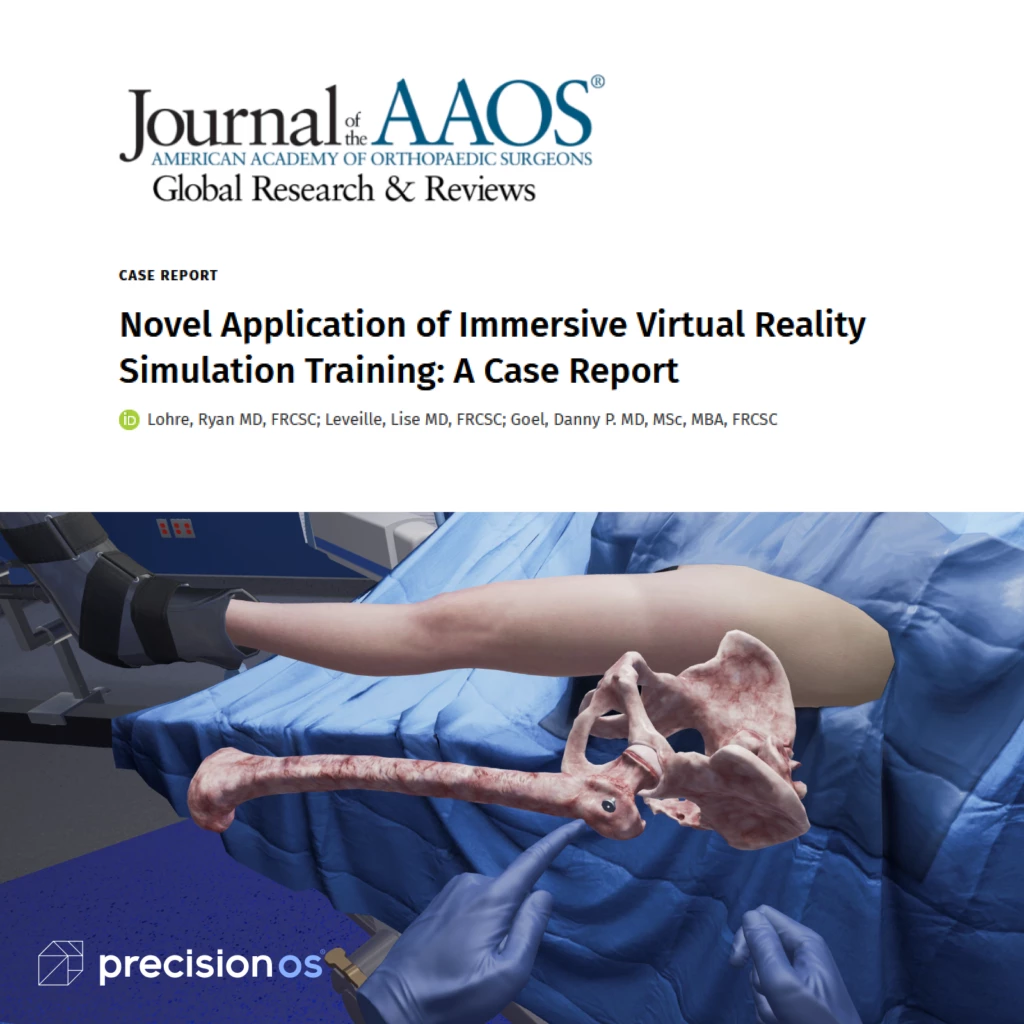VANCOUVER, BC, December 7, 2021. Researchers now have the first case report of how the skills acquired via PrecisionOS immersive virtual reality (iVR) training can directly improve and impact surgeon performance in a real operative case.
The documented report, which involved PrecisionOS® orthopedic surgeon training used at the University of British Columbia Medical Center (UBC), was published in JAAOS Global Research & Reviews, November 2021-Volume 5, issue 11. “Novel Application of Immersive Virtual Reality Simulation Training: A Case Report.”
Outline of study: a 15-year-old patient presented with chronic groin and leg pain. The treating surgeon diagnosed the young man with slipped capital femoral epiphysis (SCFE) and undertook a per-cutaneous pinning procedure (placing an implant into the hip), halting the surgery due to difficulty with visualization of the leg bone structure and interpretation. The surgeon later returned the patient to the operating room (OR) for a second attempt which was also unsuccessful. These two failed surgical attempts involved significant doses of anesthetic and radiation.
The patient was then transferred to the children’s hospital in the same medical center where the fifth-year orthopedic resident on duty practiced with a SCFE training module four consecutive times using the PrecisionOS iVR system The resident, who had not observed nor performed this procedure in more than two years improved his 3D spatial awareness by using the capability of the VR software to pull the deformed bone out of the body, and, after using many unique approaches and implant sizes offered by the PrecisionOS training module, determine the right implant for the procedure.
After completing the training, where his practices showed he had improved his performance evaluation from 70% to 93% (maximum score 100%). on PrecisionOS’ proprietary Precision Score tm analysis, the resident then went into a live operating room (under supervision only by a pediatric fellowship trained orthopedic attending surgeon), and positioned the bone in the correct location.. During his practice surgery he also learned he would able to use significantly less radiation.
PrecisonOS’ proprietary analysis score takes into consideration several variables related to performance including errors made, implant chosen, complications and technical skill. From the first to last practice case, the resident’s time was lowered from 8 minutes 44 seconds in the first session to 3 minutes 46 seconds, equating to a 232% reduction in training time.
Unlike any other system, this resident had the opportunity to engage in true simulation using the PrecisionOS system. It’s very encouraging to see how this technology, and their validated research findings can now have a direct impact on patient care,”. Dr. Kishore Mulpuri, Orthopedic Surgery Chair, UBC, said. This software has significant patient safety implications which is always our top priority as clinicians and educators”
Training with PrecisonOS also meant the patient was ultimately exposed to 1/10th the radiation dose of the original unsuccessful surgeries, and far less anesthetic time, establishing the significant patient safety implications of this system.
“Being able to really feel like I actually performed the procedure four times before taking the patient to the OR was like night and day,” Ryan Lohre, M.D., the surgical resident who performed this procedure, stated. “It is not a stretch to say that PrecisionOS’ virtual reality training truly has the potential to save millions of patients from unnecessary pain, radiation, anesthetic time and hospitals from significant costs.”
The Case Report suggests that the use of the unique and validated approach to simulation implemented by PrecisionOS offers an unparalleled opportunity for surgeons’ to improve their performance, decision making, cognitive understanding and psycho motor skills before performing treatments on patients
About PrecisionOS
PrecisionOS was founded in partnership with clinical orthopedic surgeon educators and an expert group of XR (virtual reality, augmented reality and mixed reality) developers to create training for orthopedic surgeons. The company’s immersive simulations are scientifically validated, peer-reviewed and published in leading medical research journals. Participants engage in a realistic operating environment, alone or in collaboration with other trainees anywhere in the world, test their knowledge and desire to try alternate approaches, receive instructive feedback and repeat procedures until achieving proficiency.
PrecisionOS is based in Vancouver, BC, with collaborative affiliations with more than 40 major medical institutions in the U.S., Canada. Their software has been used in more than 35 countries and 500 cities worldwide.
Media Contact:
Elaine Murphy; 818.613.1951; emurphypr@outlook.com


